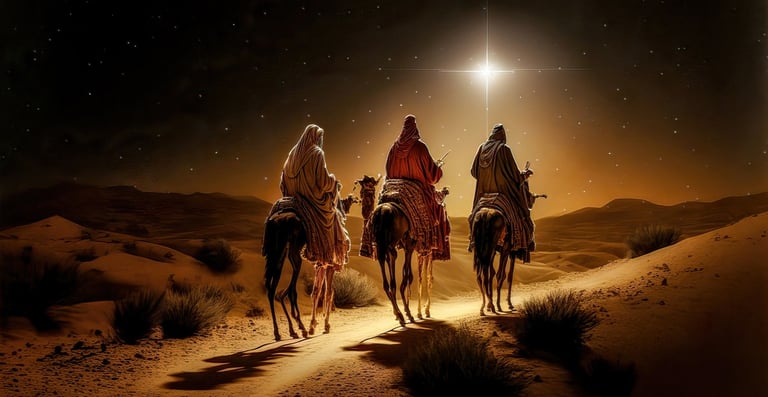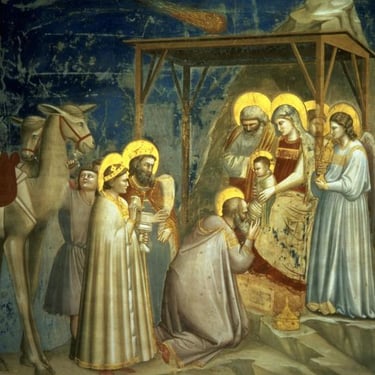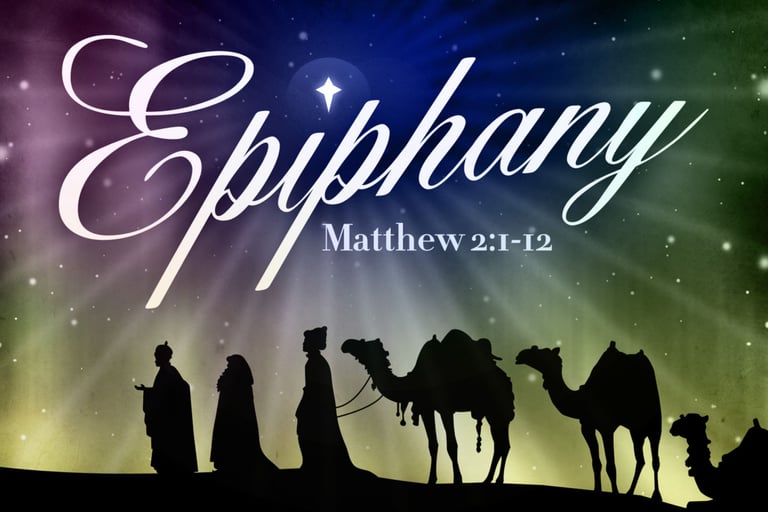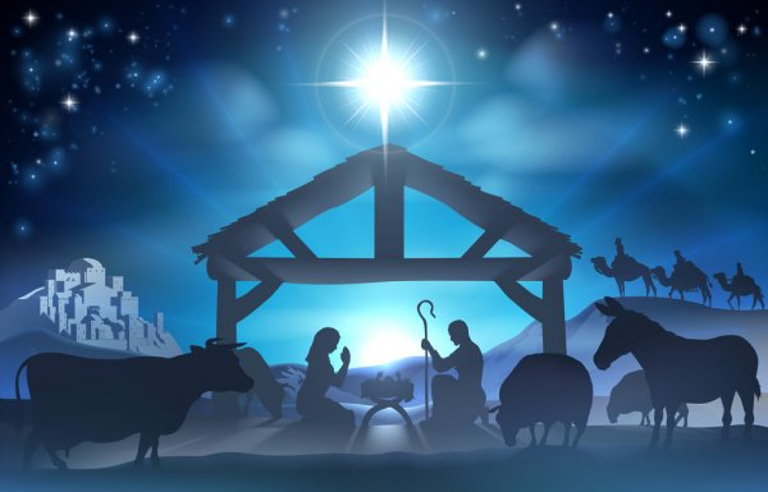How To Keep Christmas Joy Alive Celebrating Epiphany
The Three Kings: Epiphany's Role in Christmas Traditions
Grace Callahan
1/2/202510 min read


Introduction
The Christmas season brings joy, family togetherness, and a celebration of Jesus Christ's birth. However, for many Christians, the festivities extend beyond December 25th. The season continues until January 6th, known as Epiphany. This important day marks the visit of the Three Kings to the newborn Jesus, revealing His divine nature to the world. In this post, we will explore how Epiphany enhances the Christmas season and its significance in the liturgical calendar.
Understanding Epiphany: The "Manifestation" of Christ
Epiphany, from the Greek word meaning "manifestation" or "appearance," celebrates the moment when Jesus was revealed to the Gentiles, symbolized by the visit of the Magi. While Christmas focuses on the birth of Jesus, Epiphany shifts the focus to his divine revelation and the acknowledgment of his kingship by the wise men from the East. The Epiphany story is found in the Gospel of Matthew, where it is recorded that the Magi, guided by a star, traveled to Bethlehem to honor the infant Jesus with gifts of gold, frankincense, and myrrh.
This event serves as the culmination of the Christmas story, transitioning from the quiet, humble birth in a manger to the recognition of Jesus as the King of Kings. Thus, while Christmas celebrates the incarnation of God in human form, Epiphany acknowledges that this revelation is not just for the Jews but for all of humanity.
A Liturgical Bridge: How Epiphany Extends the Christmas Spirit
Epiphany serves as a powerful liturgical bridge between the Christmas season and the more solemn period of Lent and Easter, completing the twelve days of Christmas and extending the joy and celebration of the birth of Jesus. This feast marks the culmination of the Christmas festivities, allowing Christians to reflect not only on the birth of Christ but on the broader revelation of Jesus to the world.
The Twelve Days of Christmas and Epiphany
The Twelve Days of Christmas—beginning on Christmas Day and concluding on January 6th with the feast of Epiphany—serve as a sacred bridge between Advent, which focuses on anticipation and preparation, and the solemnity of Lent. This period of festivity, joy, and reflection allows Christians to fully immerse in the mystery of Christ's coming and then transition into the reflective journey of Lent. While Christmas celebrates the birth of Jesus as the incarnate Word of God, Epiphany celebrates the manifestation of Jesus as the Messiah, recognized not only by the Jewish people but by the Gentiles, represented by the Magi.
The Christmas-Epiphany Connection
In many ways, Christmas and Epiphany form a complementary pair within the Christian liturgical narrative:
Christmas invites believers to marvel at the miraculous event of God's incarnation, the arrival of Jesus as a vulnerable child in a humble stable.
Epiphany, by contrast, invites believers to consider how this divine child is recognized as the Savior of the world, not only by his own people but by outsiders—represented by the Magi who travel from afar to offer their gifts.
Together, these two feast days create a full narrative arc of the Incarnation: Jesus' birth and the recognition of His divinity. Epiphany underscores the universal significance of Jesus' birth, reminding Christians that His light extends beyond the boundaries of Israel to all nations, cultures, and peoples. The visit of the Magi underscores the message that Christ is for everyone.
Epiphany as the Continuation of Christmas Joy
Though Advent and Christmas focus on the anticipation and celebration of Jesus' birth, Epiphany takes this joy a step further, offering a deeper understanding of what that birth means. Epiphany emphasizes that the story of Jesus is not limited to a particular time or place but is meant to reach and impact the whole world. The journey of the Magi, who bring gifts from afar, signals that Christ's light has been revealed to the nations and that His presence offers salvation to all.
Epiphany helps to maintain the celebratory tone of Christmas while deepening its significance. The recognition of Jesus as Messiah by the Magi affirms the revelation of God to humanity, and the journey of the wise men to the newborn King helps Christians understand that this divine revelation is not exclusive but available to all who seek it. It reminds us that Christ's coming was a gift for the world, not just for a select few.
A Time of Spiritual Reflection
While Advent and Christmas draw our attention to the mystery of God's incarnation, Epiphany invites us to reflect on what that revelation means for us today and how we, like the Magi, are called to acknowledge Christ’s divinity and offer Him our gifts. The season of Epiphany can be a time of spiritual renewal, where Christians are encouraged to deepen their faith and expand their understanding of God's universal message.
Epiphany is more than just the end of Christmas—it is a continuation of the joy, celebration, and revelation that began with Christ’s birth. It acts as a liturgical bridge, drawing believers from the joy of Christmas to a deeper understanding of God's mission for the world. Through Epiphany, the light of Christ is revealed to all nations, reminding Christians that the story of Jesus Christ is one of universal significance, extending hope and salvation to everyone.
Cultural Traditions: Epiphany as a Continuation of the Christmas Festivities
Around the world, Epiphany is marked by a variety of cultural traditions that continue the celebrations of Christmas. These practices, rooted in both religious observance and joyful festivity, help to bridge the gap between the birth of Christ and the revelation of his kingship. Here are a few examples of how different cultures celebrate Epiphany:
King Cake: In countries like France, Spain, and Mexico, the tradition of eating King Cake during Epiphany is widespread. The cake is often decorated with colorful sugar (purple, green, and gold) to represent the three gifts of the Magi and is typically shared among family and friends. A figurine or a bean is hidden inside the cake, and the person who finds it is crowned “king” for the day, reflecting the kingship of Christ.
Three Kings Day Parades: In many Latin American countries and parts of Spain, Epiphany is celebrated with parades honoring the Three Kings. In some places, children leave their shoes out for the Kings to fill with gifts, mirroring the tradition of gift-giving associated with Christmas. These parades are often festive and full of music, dancing, and pageantry, highlighting the celebratory nature of the holiday.
The Blessing of Homes: In some cultures, Epiphany is a day when homes are blessed. This practice is especially common in Eastern Orthodox and Catholic traditions. It is believed that the blessings offer protection and purity for the year ahead. Priests may visit homes, marking doorways with the initials of the three kings (often written as “CMB” for Caspar, Melchior, and Balthazar), along with the current year.
Epiphany Pageants: In many Christian communities, particularly in the United States and Europe, churches host Epiphany pageants that reenact the arrival of the Magi at the stable in Bethlehem. These performances are often part of a larger family service, bringing together the community in celebration and education.
These cultural traditions serve to keep the spirit of Christmas alive and deepen the significance of the holiday. They also help families and communities reflect on the theme of revelation and universal inclusion that is central to Epiphany.
Epiphany as a Spiritual Bridge: From the Nativity to Lent
Epiphany plays a vital role in the liturgical calendar by acting as a spiritual bridge from the joy of Christmas to the penitence of Lent. It serves not only as the end of the Christmas season but also as a transition into the unfolding story of Jesus' life and mission. For many Christian denominations, the first Sunday after Epiphany marks the Baptism of Jesus, connecting Christ’s revelation to the beginning of his public ministry, which will lead to his ultimate sacrifice during Lent.
From Birth to Mission: The Significance of Epiphany
While the Nativity focuses on the joyful birth of Christ, the beginning of God's incarnation on earth, Epiphany emphasizes his divine identity as the Messiah. The visit of the Magi is a pivotal moment in the life of Jesus, as it signals the revelation of his true nature to the world. The Magi, representing the nations beyond Israel, bring gifts to the child Jesus, acknowledging him as the King and Savior of all humanity.
Epiphany also underscores the fulfillment of prophecies—Jesus as the long-awaited Messiah, not just for Israel, but for all nations. This time draws believers into reflection on how Christ's light shines beyond the boundaries of Israel, inviting the Gentiles and the nations into the salvation story. This universal message of revelation encourages Christians to share the light of Christ with others, embracing the call to mission that will unfold through Jesus' ministry.
The Joy of Epiphany and the Journey to Lent
Epiphany, though it marks the transition toward the more solemn season of Lent, maintains a festive tone as it celebrates the divine revelation of Jesus' kingship. The wise men's journey signifies the recognition of Jesus' divine nature, a theme that continues to resonate throughout the Epiphany season. Epiphany invites believers to celebrate and reflect on the light of Christ, which is offered to all people, and to acknowledge the revelation of Christ's mission on earth.
This joyful celebration sets the stage for the penitential season of Lent, which begins on Ash Wednesday and leads to Easter, where the ultimate revelation of Christ’s power and resurrection takes place. Lent is a time of self-examination and penance, focusing on Jesus' suffering, death, and resurrection. The contrast between Epiphany's festivity and Lent's penitence underscores the profound mystery of the Christian faith, as believers are invited to reflect on both the joyful revelation of Jesus and the sacrificial path he walks to fulfill his mission.
A Time of Reflection and Preparation
As the church transitions into Lent, Epiphany serves as a moment to reflect on the significance of Christ’s identity as Messiah and to prepare spiritually for the journey of Lent. It invites believers to celebrate the revelation of Christ while recognizing the humility of his mission. As Christians look toward Lent, the joy of Epiphany inspires a renewed commitment to sharing the gospel and to walking alongside Christ in the season of penance and reflection.
Epiphany is more than just the end of Christmas—it is a spiritual bridge that connects the celebration of Jesus' birth with the solemnity of Lent. It offers a profound reflection on the identity and mission of Christ, emphasizing that his light is meant to shine for all nations. As the church transitions into the season of Lent, Epiphany reminds Christians of the universal nature of Christ’s revelation and encourages believers to live out that light in their daily lives as they prepare for the ultimate revelation of Christ’s resurrection at Easter.
Why Epiphany Complements Christmas: A Time to Reflect and Celebrate
Epiphany is more than just a theological marker on the calendar; it plays a vital role in deepening the meaning of the Christmas season and inviting believers to continue their celebration of Christ's birth. While Christmas focuses on the birth of Jesus, Epiphany expands the significance of this event by showing that the King of the Jews is also the King of all nations. It underscores the universal scope of Christ’s mission, reminding us that God’s love and light extend to all people, not just a select few.
A Broader Understanding of Christ’s Mission
Epiphany takes the joy of Christmas and broadens its reach. It shows that Jesus' birth was not just a moment for Israel, but for all nations. The visit of the Magi, often seen as the first Gentiles to recognize Jesus as the King, highlights this universal revelation. Their journey from distant lands to honor the Christ child symbolizes the invitation for all people, from every corner of the world, to come to Christ.
This understanding shifts the focus of Epiphany from an exclusive event to a global celebration, where the light of Christ is offered to all, inviting all nations to see and recognize the Messiah.
Epiphany as a Continuation of Christmas Joy
For many Christians, Epiphany serves as an invitation to continue celebrating the joy of Christmas. The festive mood that surrounds Christmas doesn’t have to end with the 25th of December. Epiphany provides an opportunity to keep the Christmas spirit alive, extending the season by reflecting on the ongoing mystery of Christ’s presence in the world.
This celebration is a time to embrace the significance of the Magi's journey, the King Cake tradition, and the blessings of homes, which all invite a deeper sense of joy and thankfulness. By honoring the visit of the Magi and the revelation of Jesus as the King of all nations, Epiphany encourages Christians to not only reflect on Christ’s birth but also to share that light with others.
A Pause for Reflection Amidst the Hectic Holiday Rush
In a world that often rushes from one holiday to the next, Epiphany offers a unique opportunity to slow down and reflect on the meaning of Christmas in a broader context. It allows believers to connect the dots between the birth of Jesus, his revelation to the Gentiles through the Magi, and the hope that he brings to all people.
Epiphany is not merely a transition into the next season; it is a celebration of the light that has entered the world—a light that continues to shine brightly throughout the year. It serves as a reminder that Jesus' mission is ongoing, and we, as believers, are called to carry that light forward into the coming seasons of Lent and Easter.
Celebrating Christ’s Ongoing Presence
Epiphany complements Christmas by shifting the celebration from the birth of Jesus to the revelation of his identity as the Messiah for all. It’s an opportunity to extend the joy of Christmas and embrace the ongoing mystery of God’s presence in the world. This time of reflection invites believers to connect with the deeper meaning of Christ’s mission and to share his light with those around them. As the days grow shorter and the seasons change, Epiphany invites Christians to keep the Christmas joy alive by focusing on the universal love Christ offers to all nations and people.
Conclusion
Epiphany enriches the Christmas season by highlighting Jesus' kingship, reminding us that his message is for everyone. This celebration fosters joy and reflection, bridging the nativity story to the ongoing mission of Christ. As we honor this special day, remember that the joy of Christ's birth is just the beginning. Embrace the spirit of Epiphany in your hearts and lives as we carry this message of hope and love throughout the year. Celebrate the universal nature of Jesus' mission and encourage those around you to join in.






